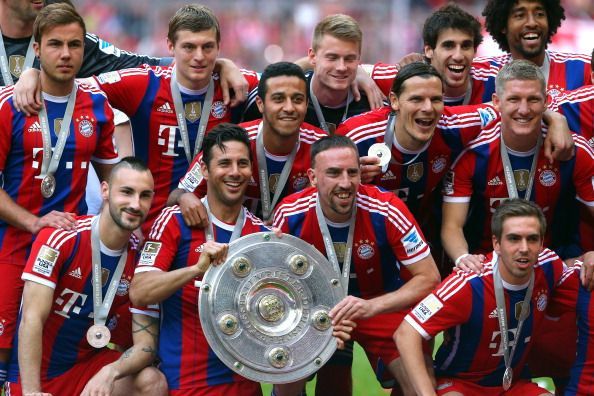

Bayern Munich and Paris Saint-Germain dominate their respective leagues, but their importance has not waned
Feature 18 Jun 2018, 00:09 IST
FC Bayern Muenchen v Borussia Dortmund – Bundesliga
For the sixth time in succession and the eight occasion in 10 years, the Bundesliga trophy was lifted by a Bayern Munich side at the end of the 2017-18 season that appears utterly unrelenting in its pursuit of glory. Meanwhile, in France, Paris Saint-Germain swept the board to claim all three major domestic honours without a glove really being laid upon them.
It was with no hint of surprise that either of these events occurred. Well before the season had even kicked off, it could have been predicted that both sides would triumph.
Bayern have long had an iron grip on football in Germany, while the financial dominance of PSG in Ligue 1 makes it tough to see how anyone could possibly challenge their supremacy, particularly in light of UEFA ruling that they did not breech Financial Fair Play (FFP) legislation as they bought Neymar and Kylian Mbappe for record sums totalling over €300 million.
And yet to call the Bundesliga and Ligue 1 meaningless would be staggeringly naïve.
Ligue 1, in particular, has thus far shown remarkable resistance to PSG’s spending. Given the capital club’s budget dwarfs that of the rest of the league, it is remarkable that they have won the title in only five of the seven seasons since QSI took over. Additionally, in the last 11 years, seven different clubs have won the title – a spread of diversity that is unmatched in Europe’s top divisions.
Moreover, Monaco showed by beating PSG to the title last season that success is possible, even if the probability is that it is only fleeting. And in reaching the final of the Europa League, Marseille, who finished fourth in the standings only to be outclassed by Atletico Madrid, the runners-up in Spain, displayed that there is also undervalued depth in the division, too.
There is more tangible evidence to suggest that Ligue 1 is on the rise, too, albeit driven by the appeal of PSG and Neymar, in particular. Spanish company Mediapro recently signed a four-year deal worth €4.6 billion (€1.15bn per season) to take the value of the television deal in France above that of Serie A and La Liga, only a hair behind Germany and significantly trailing the behemoth that is the Premier League.
This represents an increase of 60% for the French League, much of which will be passed on to its leading clubs from the 2020-21 season.
Newcastle United v Chelsea – Premier League
France has established itself as the leading market of star production, too. Players coming out of the academies of even relatively modest clubs are often blessed with the potential to make it to the very top, as the stratospheric rises of N’Golo Kante (Caen) and Riyad Mahrez (Le Havre) over the course of the last five years have emphatically shown.
And in the form of Monaco, they have perhaps the best finishing school for such players looking to take the step up to elite level. Benjamin Mendy and Bernardo Silva of Manchester City, the aforementioned Mbappe as well as Thomas Lemar, who recently joined Atletico Madrid, are some of the best examples of such players.
Indeed, rather than meaningless, there is a strong argument to suggest that France’s top flight is thriving, despite the dominance of its leading club.
Over in Germany, meanwhile, there are similar strengths.
Bayern winning the Bundesliga for year after year is no new phenomenon brought in by the rise of television money and revenue from their continued success in reaching the latter stages of the Champions League; the Bavarians have won the top flight 28 times in its 54-year history. That’s more than one from ever two it has been contested. Never before has this depleted the worth of the domestic game.
It is worth pointing out, however, that after the success of rebooting over the course of the last decade, there was something of a slump in the 2017-18 season. German clubs performed sixth in Europe, according to UEFA’s coefficient, which placed them behind Russia and France, and only just ahead of Austria and Portugal.
Bayern Munich vs Borussia Monchengladbach
But still, there is no crisis in German football – at least yet.
Attendances continue to be buoyant and the commercial side of the game remains strong, while the fact that many clubs are fan owned means that it has retained a soul and a passion that has often been lost elsewhere at the highest level.
Indeed, the Bundesliga and Ligue 1 are facing challenges no different to any other leagues. In Italy, they might have had a more spectacular title race, but Juventus have now won the title for seven successive years, while the financial position of AC Milan, a flagship club, remains perilous.
In Spain and England, meanwhile, the top three and six finishers in each division respectively are almost entirely predictable.
So no, Ligue 1 and the Bundesliga have not become meaningless and show few signs of doing so.
Fetching more content…
Fetching more content…

Be the first to comment